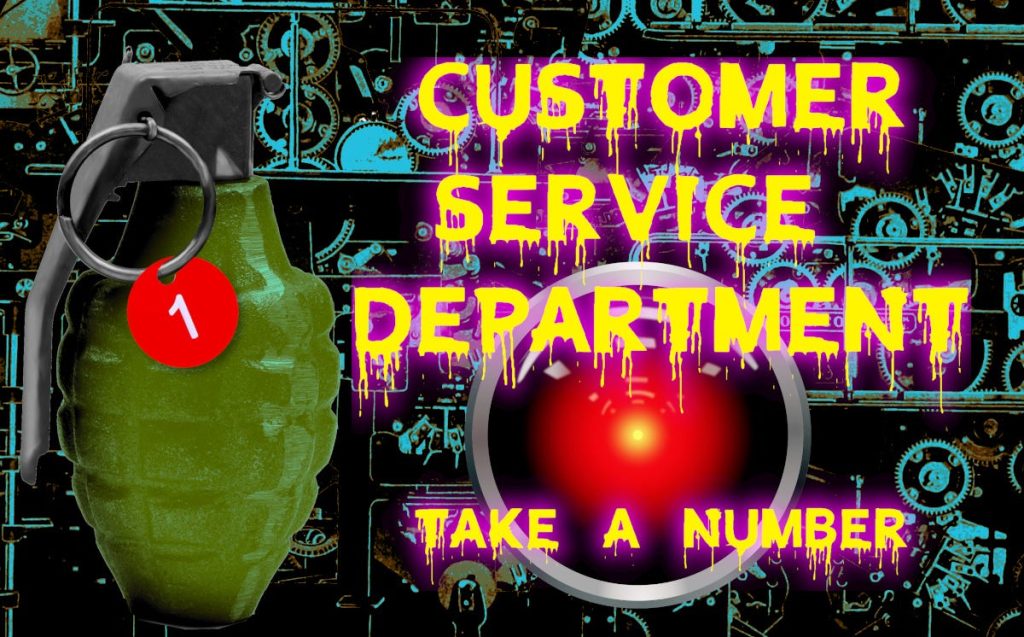I don’t think AI can do your job (but I do think an AI salesman can convince your boss to fire you and replace you with an AI that can’t do your job). However, there is a class of workers whose jobs can be performed perfectly by AI: workers with bullshit jobs:
David Graeber’s “Bullshit Jobs”: why does the economy sustain jobs that no one values?
David Graeber (RIP) identified several kinds of bullshit jobs and not all of those can be perfectly performed by an AI (for example, the flunkies that minor corporate princelings surround themselves with to demonstrate their status need to be human). But there are whole categories of job that perform functions that corporations don’t want performed, like customer service rep, jobs they’ve spent decades degrading to the point where the people who do them have been stripped of all power and authority and serve no function except allowing a company to claim that they have a customer service department.
Replacing these workers with an AI not only saves money by removing their wage-bill from the corporate overhead, but it can actually turn the former cost center into a profit center. That’s what Air Canada discovered when they replaced their customer service workers with chatbots. These chatbots gave bad advice to fliers that cost them money, and in every instance except one (where the aggrieved flier was so tenacious that he chased 8 weeks’ worth of internal appeals at Air Canada before escalating the matter to a regulator), Air Canada got to keep the money:
https://www.forbes.com/sites/marisagarcia/2024/02/19/what-air-canada-lost-in-remarkable-lying-ai-chatbot-case/
All of this raises an obvious question: how can Air Canada (and other companies) get away with having customer service reps who are so useless that they can be swapped for defective chatbots?
The answer lies in enshittification. While most people who encounter the idea of enshittification glom onto the symptoms it describes, of a three-stage process by which platforms shuttle value from users to business customers to themselves, the crux of enshittification is why this decay takes place. The answer is power: firms that enshittify must first overpower the forces that keep their enshittificatory impulses in check, like competition and regulation (these are two sides of the same coin: getting rid of competition paves the way for regulatory capture).
Over decades, Air Canada has merged with the majority of its competitors and has become so structurally important to Canada — a big, geographically dispersed country with many fly-in settlements — that regulators can’t really threaten it with meaningful penalties, not without threatening Canada itself. They’re too big to fail, thus too big too jail, thus too big to care.
That’s how Air Canada was able to turn its customer service department into such a joke that it just didn’t matter anymore, and so it didn’t matter if it replaced those purely ornamental customer service reps with chatbots.
The rise and rise of overseas call-center outsourcing paved the way for AI replacement in the same way that Walmart paved the way for Amazon. Once Walmart destroyed your town center and vaporized all the businesses that served your community, why wouldn’t you shop on Amazon? Likewise: once companies replaced their customer service department with immiserated overseas call-center workers who were required to recite rote responses from a three-ring binder and were given no agency or capacity to solve your problem, why not replace them with AIs?
Monopolistic firms are full of people who they don’t value because they do jobs the company doesn’t value (e.g. moderators on large social media services).
This week, I’m at Skyboat Media studios, recording the audiobook for the Enshittification book, and so I got to talking with Gabrielle De Cuir and Stefan Rudnicki, the owners. They talked about the threat they’re facing from AI audiobook “narrators,” who replace directors, actors and editors with a single piece of software.
There’s a whole class of audiobooks where AI can be a perfect substitute — thanks to Audible, and its enshittification. Audible has waged war on unionized voice actors, replacing them with desperate newbies who will tolerate terrible working conditions, including a practice called “punch and roll” that makes actors responsible for doing their own editing when they misspeak, rather than re-recording a passage for an editor to fix later (“pickups”). There are plenty of Audible books that are recorded without a director or an editor or a proofer, meaning that inexperienced actor’s mistakes and mispronunciations survive into the final product. These books, produced by the monopolist audiobook platform, with a 90%+ market share for popular fiction, are already degraded to the point of being not fit for purpose. Replacing the actors with AI barely makes a difference.
AI text-to-speech is a giant improvement on existing TTS tools, and there are plenty of people who stand to benefit from this, for example, people with visual impairments. But there’s no business model in selling readaloud bots to blind people — certainly not a model that recoups the hundreds of billions that has been sprayed around for AI training and operation.
The AI business model relies on obliterating the wage bill of workers and replacing it with a cheaper software license. Unfortunately (for the fortunes of AI investors) the majority of workers whose wages can be readily swapped for a software license are the lowest-paid, most precarious ones, people whose jobs have already been degraded and enshittified to the point where no one will notice the difference if they are replaced with a chatbot.

